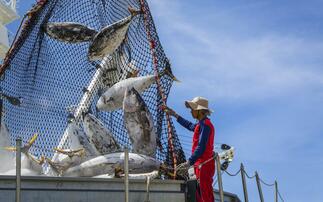Scottish farmer Pete Ritchie has embraced growing demand for organic produce and is reaping the rewards
The work of UK farmers has been radically transformed in recent years as technology and evolving consumption habits have placed fresh demands on how food is produced, processed, and dished onto consumers' plates.
But as the food chain has become bigger, more polluting and more complex, a growing disconnect has emerged between the food people consume and their knowledge of where it actually comes from.
It is this disconnect that Pete Ritchie, an organic farmer from Scotland, is working to bridge.
Together with his partner Heather Anderson, Ritchie has transformed his farm 16 miles south of Edinburgh into a learning space for the public to understand how today's food is produced.
Although the UK imports just over half of the food it consumes, more than 70 per cent of the country's land area is used for agricultural purposes. But in spite of the fact so much of the country is used to grow and produce food, Ritchie believes most people still know little about the origins of the food they eat.
At Whitmuir farm, Ritchie and his partner Anderson give visitors an insight into the reality of modern farming.
"It is quite a small farm but it's not pretend," Ritchie says. "There are no animals to pet."
A shop sells all of the farm's produce directly to the public and people can enjoy fresh food at its café and restaurant or wander through its art gallery.
Whitmuir Farm is a successful example of how farmers like Ritchie can diversify their stream of income and tap into an organic food market that continues to grow rapidly. Organic certified produce enjoyed their sixth consecutive year of growth last year, with the market expanding six per cent to a record £2.2bn.
However, transforming a farm into a community space and showcase for organic food is no small task.
Ritchie tells BusinessGreen that despite having no farming background he had always wanted to grow fruits and vegetables. In 2000, he bought the 140-acre (54 hectare) farm and has worked to develop the site ever since.
He started farming organic beef and sheep, selling his meat to large retailers.
"Our cattle were being sent 500 miles away to Devon to an organic sort house," he recalls. "We used to put the cattle on a truck and go to the supermarket to buy our food. Our lamb could have been on the shelves of the next door shop and we couldn't have known."
In 2008, Ritchie stopped selling his meat to large retailers, choosing instead to sell it directly to the public and local independent retailers. he also introduced pigs, poultry, soft fruits and vegetables to the farm.
From working on the farm on his own and part-time, Ritchie now manages a team of 12 full times employees.
The diversification of the farm's activities also transformed Ritchie's work as a farmer, requiring him to develop new business skills and get up to speed with health and safety requirements, environmental regulation, and employment law.
Ritchie says the farm's new activities have not yet made him better off, adding that "ultimately, you ran faster to stay still". Instead, he said it created "more jobs per pound of turnover" for the local community, all the while producing more food in a less-carbon intensive way than if it had been produced by a conventional farm.
Ritchie argues "re-emerging" small scale horticulture could provide thousands of good new jobs across the UK. "People want cheap food but there is minority of people ready to pay a bit more for their food and that minority is growing," he says.
He also suggests that on-farm food processing, such as making bread, fruit juices and jam can add value to farms' produce in a carbon efficient way, while creating yet more rewarding jobs.
And he predicts there are plenty of jobs to be created in educated people about food. This could include teaching children about the food system but also talking to chefs and other professionals from the catering industry about the need for sustainably-produced food that meet people's nutritional needs and is accessible to everyone.
According to Ritchie, part of this education process needs to address how the whole farming and agriculture sector can reduce greenhouse gas emissions and embrace more sustainable practices.
Indeed, agriculture accounts for around 10 per cent of the UK's greenhouse gas emissions with the government's advisory body, the Committee on Climate Change, warning that robust government policies are needed to deliver cost-effective emissions reduction across the sector.
Ritchie argues tackling climate change and transitioning to a low carbon economy will require the transformation of the food system from an extractive model to one which respects animal welfare and the environment.
As chief executive of Nourish Scotland, an NGO which advocates for a fairer and more sustainable food system, Ritchie says he wants to shift away from the current model of producing "volumes of cheap food which drive environmental destruction" and "leave people with poor health".
Instead, he says the wider food system should abandon the current forms of pesticide-fuelled agriculture and strive to reduce waste and emissions, better protect animal welfare, and ensure people on low incomes can have access to healthy and sustainable food.
To deliver on this vision, Ritchie says that regulation can play an important part in facilitating solutions and he argues the government needs to "provide the policy framework to make these things happen by ramping up regulation on animal welfare, pesticide use and waste" - something Environment Secretary Michael Gove has hinted he is interested in with his repeated commitments to delivering a 'high standards' Brexit.
Ritchie argues farmers have a huge responsibility. "The main issue is to look after the planet and its biodiversity, all the while feeding ourselves well," he says.
And for those tempted to help meet that challenge and become part of the new generation of farmers that are working to transform the food system, Ritchie has one piece of advice: "To do the sort of farming and food production that allows you to feel connected to the public is a craft. And like any other craft, you are going to have to do an awful lot of practising if you want to get any good at it."








